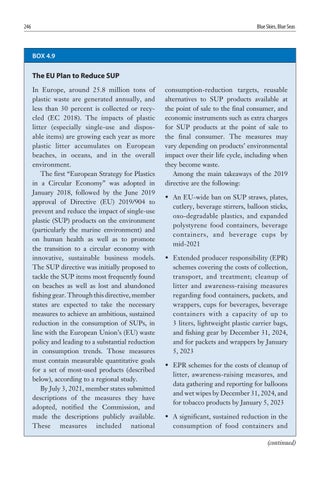246
Blue Skies, Blue Seas
BOX 4.9
The EU Plan to Reduce SUP In Europe, around 25.8 million tons of plastic waste are generated annually, and less than 30 percent is collected or recycled (EC 2018). The impacts of plastic litter (especially single-use and disposable items) are growing each year as more plastic litter accumulates on European beaches, in oceans, and in the overall environment. The first “European Strategy for Plastics in a Circular Economy” was adopted in January 2018, followed by the June 2019 approval of Directive (EU) 2019/904 to prevent and reduce the impact of single-use plastic (SUP) products on the environment (particularly the marine environment) and on human health as well as to promote the transition to a circular economy with innovative, sustainable business models. The SUP directive was initially proposed to tackle the SUP items most frequently found on beaches as well as lost and abandoned fishing gear. Through this directive, member states are expected to take the necessary measures to achieve an ambitious, sustained reduction in the consumption of SUPs, in line with the European Union’s (EU) waste policy and leading to a substantial reduction in consumption trends. Those measures must contain measurable quantitative goals for a set of most-used products (described below), according to a regional study. By July 3, 2021, member states submitted descriptions of the measures they have adopted, notified the Commission, and made the descriptions publicly available. These measures included national
consumption-reduction targets, reusable alternatives to SUP products available at the point of sale to the final consumer, and economic instruments such as extra charges for SUP products at the point of sale to the final consumer. The measures may vary depending on products’ environmental impact over their life cycle, including when they become waste. Among the main takeaways of the 2019 directive are the following: • An EU-wide ban on SUP straws, plates, cutlery, beverage stirrers, balloon sticks, oxo-degradable plastics, and expanded polystyrene food containers, beverage containers, and beverage cups by mid-2021 • Extended producer responsibility (EPR) schemes covering the costs of collection, transport, and treatment; cleanup of litter and awareness-raising measures regarding food containers, packets, and wrappers, cups for beverages, beverage containers with a capacity of up to 3 liters, lightweight plastic carrier bags, and fishing gear by December 31, 2024, and for packets and wrappers by January 5, 2023 • EPR schemes for the costs of cleanup of litter, awareness-raising measures, and data gathering and reporting for balloons and wet wipes by December 31, 2024, and for tobacco products by January 5, 2023 • A significant, sustained reduction in the consumption of food containers and (continued)






